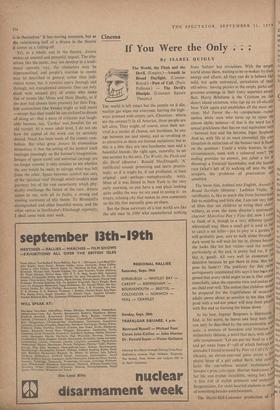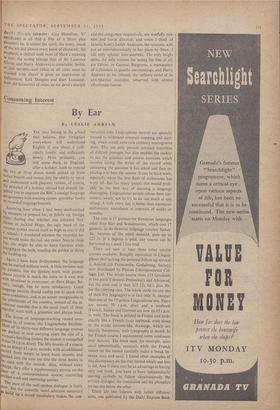Cinema
If You Were the Only ; • •
By ISABEL QUIGLY
The World, the Flesh and the Devil. (Empire.)—Assault in Broad Daylight. (Cameo- Royal.)—Port of Call. (Paris Pullman.) — The Devil's Disciple. (Leicester Square Theatre.) THE world is left intact but the people on it die; nuclear gas wipes out everyone, leaving the high- ways jammed with empty cars. (Question : where are the corpses?) In all America, three people are left alive. They might, of course, since their sur- vival is a matter of chance, not hardiness, be any age between ten and ninety, and as revolting or as attractive as there are human variations; but as this is a film they are two handsome men and a beautiful blonde, the right ages, naturally, to set one another by the ears. The World, the Flesh and the Devil (director: Ranald MacDougall; 'A' certificate) sounds promising and starts promis- ingly; as if it might be, if not profound, at least original and—perhaps—metaphysically witty. Most of it was filmed in New York in the very early morning, so you have a real place looking quite unlike the way we are used to seeing it: an empty, echoing city that makes its own comments on the life that normally goes on there.
But the three survivors of a lost world are like the old man in 1984 who remembered nothing from 'before' but trivialities. With the empty
world about them, waiting to be re-woken by their energy and efforts, all they can do is behave like mild, but quite unironical, caricatures of their old selves: having picnics in the empty parks and gracious evenings in their (very separate) empty flats. Harry Belafonte is the Crichton on this I desert island existence, who rigs up an all-electric New York again and establishes all the main serf vices; Mel Ferrer the—by comparison—rather useless white man who turns up to upset the almost idyllic balance—if that is the word for sexual prickliness that has no real equivalent here —between him and the heroine, Inger Stephens. And so, with life at its most elemental, the con' tinuation or extinction of the human race is based, on the question : Could a white woman, in an?' circumstances, mate with a coloured man? The ending provides no answer, just (after a bit of shooting) a fraternal handshake, and the human race (what's left of it) walking off into the skr' th scrapers, the problems of procreation still] n
unsettled.
The Swiss film, dubbed into English, Assault th Broad Daylight (director : Ladislao Vajda; , Pc certificate), is, like so much else from Switzerland' pr pr fair to middling and little else. I am not very fon° or of films that use children to wring their elders withers, as even the same director's sentimental charmer Mareelino Pan y Vino did, now I cone to think of it, though in a very different (pions' whimsical) way. Here a small girl is used as ball to catch a sex killer—put to play in a garden he will probably pass, sent to walk alone through dark wood he will wait for her in, chosen because she looks like his last victim—and the tensioa. particularly at the end, is pretty bad (or, if yoli like it, good). All very well to exonerate the detective because he got there in time. But sur pose he hadn't? The publicity for this rather ambiguously intentioned film says it has been stir gested that every child ought to see it. Our censtie' mercifully, takes the opposite view and makes stir; no child ever will. The notion that children shall be prepared for the frightfulness of occasion° adults seems about as sensible as the idea the!' prod with a red-hot poker will stop them playing with fire and so burning the house down. At his best, Ingmar Bergman is depressing. find; at his worst, he leaves one limp with vsh$, can only be described by the untranslatable wordo noia: a mixture of boredom and irritation an melancholy distaste, a word that says, with ado'c able compression. 'Let me put my head in a sa-ti to t and get away from it'—all of which feelings 3r1 are attitudes I found aroused by Port of Call ('X' ter reci tificate), an eleven-year-old piece about a VI.
phatic lump of a girl called Berit, who entire,:fbe lacks the marvellous animal exuberance odeha Sweden's prize iolie-(aide, Harriet Andresson; her life and (rather incredible, seeing her) love A film full of stylish grimaces and embryo° Bcrgmanisms, for stout-hearted students in searc, of something besides entertainment. hr I The Hecht-Hill-Lancaster production of Devil's Disciple (director : Guy Hamilton; 'LI' certificate) is all that a film of a Shaw play shouldn't be. It misses the spirit, the irony, much of the wit and almost every point of character; the emphasis is shifted until most of Shaw's meaning is lost; the acting (except that of Sir Laurence Olivier and Harry Andrews) is unsuitable, feeble, or just terrible;, and (what at all costs must be avoided with Shaw) it gives an impression of tediousness. Kirk Douglas and Burt Lancaster, both old favourites of mine, as the deVil's disciple and the clergyman respectively, are woefully mis- cast and worse directed; and when I think of Janette Scott's Judith Anderson, the romantic wife put so anti-romantically in her place by Shaw, I can only splutter into asterisks. The only bright spots, the only reasons for seeing the film at all, are Olivier as General Burgoyne, a masterpiece of stylishness in gauche surroundings, and Harry Andrews as his colonel, the military mind at its anti-Shavian stupidest, observed with almost affectionate horror.



































 Previous page
Previous page